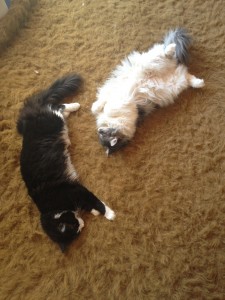 I’m over at Word Whores today, rhapsodizing about ocotillo blossoms and my self-publishing adventures – along with the three best resources I’ve found.
I’m over at Word Whores today, rhapsodizing about ocotillo blossoms and my self-publishing adventures – along with the three best resources I’ve found.
Month: March 2013
On Being Done – In So Many Ways
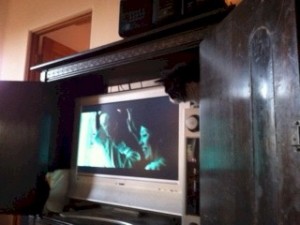 Jackson has figured out how to get up inside the TV cabinet. He’s still not sure why we stare at that screen, however.
Jackson has figured out how to get up inside the TV cabinet. He’s still not sure why we stare at that screen, however.
So, the Good News? I finished the book!!!!
(Cue screams of joy from fans and various expressions of relief and eyerolling from family and friends.)
The Bad News?
Wow, am I tired!
Not really physically tired, just emptied out. It’s really amazing, this writing-a-novel thing – it really does feel like running a marathon. (Or so I presume, not being the kind of gal who has EVER run a marathon.) Even working at a measured and even pace, by the end it feels like I’m creating an enormous soap bubble. Every day I add a bit more air, expanding it, steadying it, letting it grow larger and larger. And in the final days, I detach it from my wand and it floats away, leaving me hollow.
It’s a peculiar feeling. It’s like I have no thoughts at all.
If I could – and maybe one day when I get organized about this writer gig, I will – I’d plan for a week-long vacation post-deadline. I’d love to just go hang by a pool somewhere, order drinks from cabana boys and let myself gradually refill.
At any rate, that’s all I’ve got in me for a blog post today. I looked at my long list of very interesting potential topics and my writing brain did that thing like when your car battery is nearly dead. It kind of started to turn over, sputtered and went quiet.
Somebody send cabana boys. Stat.
Setting Goals – and Sweetening the Pot
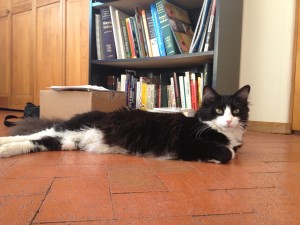 I’m over at the Carina Press spec fiction authors blog today. And because our Here Be Magic blog schedule coordinator, Veronica Scott – known affectionately as BLOGZILLA – is a big fan of my cat, Jackson, I had to throw in a pic of him.
I’m over at the Carina Press spec fiction authors blog today. And because our Here Be Magic blog schedule coordinator, Veronica Scott – known affectionately as BLOGZILLA – is a big fan of my cat, Jackson, I had to throw in a pic of him.
My Plotting Method: Toothpicks and Spider Silk
I’m over at Word Whores this chilly spring morning, talking about ending books and my plotting method (ha!).
And also, that we’re taking applications for a new Word Whore!
Being Careful with Back Cover Copy – Especially Sequels!
 I have this sentimental love for Easter lilies. Especially at this time of year. Though I don’t really do anything else Easter, I always buy an Easter lily.
I have this sentimental love for Easter lilies. Especially at this time of year. Though I don’t really do anything else Easter, I always buy an Easter lily.
Back cover copy for books is a funny realm. Referred to casually as the “BCC” in the publishing biz, those are the (usually) two paragraphs on the back of paper books, or accompanying the description with the eBook. If you’re much of a reader, you’ve probably read hundreds of these in your life. You spot the book on the shelf and pick it up. Maybe you like the author or the title intrigues you or the cover catches your eye. What’s the next thing you do? That’s right – flip it over and read the BCC. Then you might read the inside jacket copy, which is longer. Then maybe the first page. Same essential process with an eBook.
So the BCC is considered crucial in the buying decision – a position that’s hard to argue with. And, like with covers, authors only get so much input into what the BCC says. The marketing people keep a firm grip on this and it can be fascinating to see how they phrase concepts to entice readers. For example, this is my final BCC for Platinum.
Althea Grant is doing fine. Sure, her Charleston gallery is suffering from the bad economy, and her artistic aspirations have gone nowhere. But she’s happy enough. When rugged metal sculptor Steel rides up on his motorcycle looking to rent studio space, his infusion of cash is more than welcome. But his art is raw, visceral, sexual-and completely inappropriate for her pastel world of watercolor landscapes.
Steel, fascinated by Althea’s rare albino coloring, sees in her the key to his next piece: a metal satyr that can be used for bondage games. Moving into her gallery basement is the first step; seducing the coolly polite lady into modeling for him is the second.
As Steel peels away her careful manners and tasteful outfits, Althea begins to realize her life isn’t just fine at all-it’s as pale and washed-out as the watercolor paintings she’s failing to sell. Can she transform her life and accept her most secret desires?
What happens is, a person who works for Carina writes the BCC and sends it to me and my editor for input. We come up with all sorts of changes, most of which they refuse. For example, we suggested “cool Southern Belle” instead of “coolly polite lady.” Nope. I wanted to call Steel a bad boy. No dice. But the thing we really fought for was to change the final line. The one you see now is one of three possibilities we suggested.
Because what they had originally was a TOTAL SPOILER.
Really.
I won’t tell you what it was because, um, it was a total spoiler. But it essentially went “Can she do the thing she does at the end to solve her problems?”
No no no.
Surprisingly, this happens A LOT with BCC. It’s funny because writers really have to learn to say how their stories end, in dealing with the publication process. When you write a synopsis, you *have* to say how it ends. Because it’s crucial to the decision-making process for agents and editors. It’s hard to get over, this “giving-away” of the ending. Like learning to get over standing there naked while a tailor measures you for clothes. But this is how publishing works – and the people in publishing get so inured to this, that they forget not to give the ending away.
So, as the author (or editor), it’s something to really stay on top of.
I saw a new permutation of this the other day. A book had been on my Kindle for quite a while. Along with Carien at Pearls Cast Before a McPig, I’ve bee engaged in the TBR Orphan Project – where each month we read a book that’s been in our To Be Read pile for longer than three months. I saw that the book’s sequel was coming out soon, so I thought, ooh! good timing to read the first book.
I started it, got about 20% in and was liking it fine, not love love love, but just fine. Then I happened to see the BCC for the second book.
And it totally ruined it for me.
No lie.
The BCC for book 2 totally gave away the ending of book 1. Blatantly. Along the lines of “now that these terrible things happened to the heroine and now that the hero hates her and is struggle to recover from these terrible things…” I stopped reading book 1 immediately. Deleted it from my Kindle. I couldn’t keep reading, knowing how it turned out.
Now, you could argue that if I’d known it would have a happy ending, I might have kept going. Maybe? It depends on how how it was described. But this BCC was so explicit that it removed too much mystery from the story.
I don’t know if the author realized, or if she and her editor fought to change it and couldn’t. But wow.
Definitely something to keep in mind.
Why I Needed a Mission Statement
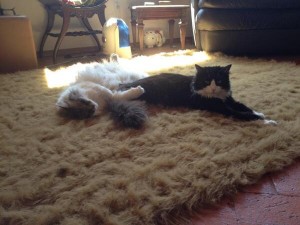 Older kitty and newer kitty are getting to be quite good companions for each other – very pleased to see it!
Older kitty and newer kitty are getting to be quite good companions for each other – very pleased to see it!
Recently I’ve been thinking about Mission Statements.
What – you don’t?
No, really. See, a fellow author asked me for a favor. It wasn’t a big favor, but I was feeling cranky about being asked. I was annoyed with this person for other reasons, for an online gaffe that the other person probably never even thought of as being rude. I never said anything about it, just fumed a little and tried to let it go. You all know how it is – you can’t get all worked up about every little thing. And I do think intention matters. It’s one thing for someone to accidentally step on your foot and another for them to deliberately grind their heel in your instep.
So, I *thought* I let it go. Until this person asked me to do something for them and I didn’t want to. And I wasn’t sure of my reasons.
There’s another side of this “helping fellow authors” thing. Julia Quinn recently said at a conference that “No one ever ruined their career helping another author.” Brenda Novak says “A high tide floats all boats.” I believe in both of these things. I think it’s important to help people and, more, I enjoy it. But I think we all know that this can go bad. There are bad apples that will take your help and then abuse you for it. There are vampires who will drain you of everything you have to give. It’s the ugly face of what is supposed to be a good and lovely enterprise. We’ve all been stung by it, I think.
Sure, we have ways of dealing. Most of us know to never give a gift with the expectation of reciprocation or even gratitude. That way the gift is given freely and it’s easier to ignore any less-than-pleasant results.
Still, after this happens a few times, when someone asks you for a favor, you can’t help but weigh it. Especially if that same person recently stepped on your foot.
This is an emotional reaction and I wanted to separate out my emotional reaction.
Thus: a Mission Statement.
When I tweeted about this, someone suggested I pick “Eat Chocolate. Drink Coffee. Write a Lot of Words.”
Which was funny – and largely accurate – but not what I was getting at.
A few years back I did this retreat weekend with some other facilitators and a bunch of sorority and fraternity members from the local campus. They were primarily the presidents and vice-presidents of their chapters. The program proved to be a fascinating one, that worked to move these leaders into focusing on their sorority’s and fraternity’s open and secret mottoes – their Mission Statements, as it were. See, every fraternity and sorority has both. For my sorority, Gamma Phi Beta, our open motto is “Founded Upon a Rock.” The letters of the sorority are an acronym for our secret motto, known only to Gamma Phi initiates.
Despite the sometimes unsavory reputation of the Greek system, these organizations were all founded with bold ideals of integrity, learning, and honor. To help guide these chapter leaders to make decisions in sync with these ideals, the program helped them think about their founding ideals.
One thing we did was work through “hypothetical issues” in small groups, as if we were on the boards of the companies involved. For example, we were the board of a pharmaceutical company and someone dies taking one of our medications. What do we do?
What was cool – all of these turned out to have been actual events. The example above was taken directly from the Tylenol poisonings in the 1980s. Those of you old enough might remember that as one of the first massive product recalls in history. It set a firm precedent. The Johnson & Johnson board members said that, at the time, the decision was easy. They looked at their Credo, which guides them to “do the right thing and act honorably” and knew exactly what to do. You can read all about it here.
The goal of this program with fraternities and sororities was to help them use their founding principles to do the same. Thus the have a compass for making decisions. It’s timely to point out that the kids who participated in/witnessed the Steubenville rape could have used similar guiding principles.
At any rate, this has been a roundabout way of describing how I came to make my own Mission Statement. So, that I would have a compass besides my bruised feelings to guide me.
As I thought about what’s important to me, I recalled a conversation I had recently about an upcoming conference. Some first-timers were nervous and I was reassuring them on details and that they could always hang with me. I remember my very first RWA conference and how I knew not one person – and how lonely I felt eating by myself next to tables full of laughing people. So I declared “Anyone can sit at my lunch table!”
After all, high school is over and in the Cafeteria of Life, we’ve all had our share of eating alone.
Once that gelled, I replied to the author asking me for a favor that amounted to no more than sitting at my table – and said yes.
It was the right thing to do.
The Luck of the Irish Just Got REAL
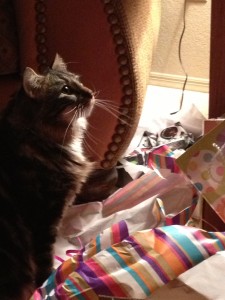 I’m over at Word Whores today, with a somewhat ranty, surprisingly sentimental post about luck, misfortune and survival.
I’m over at Word Whores today, with a somewhat ranty, surprisingly sentimental post about luck, misfortune and survival.
Writing What You Read
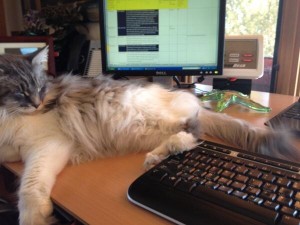 My office assistant, Isabel. At least she’s not on the keyboard, right?
My office assistant, Isabel. At least she’s not on the keyboard, right?
The other day, I saw this tweet:
D’ya think it’s poss to write a YA zombie book without ever having read ANY zombie books at all, like ever? Recommendations please folks?
This isn’t anyone I follow or who follows me – I saw it because someone I follow retweeted it. So, Unknown Person who asked this question by flinging it upon the waters of Twitter in good faith, if you see this, please don’t think I’m dissing you here. I had a long answer to your question. Longer than Twitter permits.
Plus I admire this person for asking the question in the first place. So very many people don’t. And I think it hurts them as writers.
See, there’s this idea that there’s an artistic purity in working from a vacuum. I’m not quite sure where it comes from. But people love to tell stories about the guy who never studied painting, ever but produces this amazing, unusual work. Or the young girl who spontaneously starts creating symphonies. We’re fascinated by the idea of this kind of genius, that seems to spring out of nowhere.
It also maybe is alluring, because we get the idea that we can skip a few steps and be successful anyway.
Really, I think this rarely happens. In fact, I suspect it never happens and stories meant to convey that idea are heavily massaged. There’s a reason interviewers ask bands about their influences, why people are forever asking writers who they read. Creativity comes out of richness, not a vacuum. Ideas lead to more ideas. Also, learning your craft means studying others who’ve gone before.
After all, no one really wants to hire an architect who says “Oh, I didn’t go to school because I didn’t want my creativity to be influenced by the establishment.” No CPA should touch your taxes who says she hasn’t read all that IRS stuff.
It’s great to want to be a rulebreaker, but you have to know what the rules are first. For a writer, that means reading. A lot of reading.
A few years back, I had a friend who was writing a vampire book. Only hers was a going to be a special vampire book – not like all the others. In fact, she’d never read a book with vampires in them. She had a fair amount of contempt for the genre. When I suggested a few books or authors who’ve greatly influenced that genre, she dismissed the idea. First of all, she didn’t want to waste her time reading books like that. Secondly, she wanted her book to be unique, untainted by the tropes. She planned to mix it up and do something Fresh, Exciting and New.
Who doesn’t want to do that?
Thing was, because she hadn’t read, she didn’t know which rules she was breaking. So, she would ask me, hoping for the benefit of all the energy I’d invested in reading those stories. I found that, not only was it difficult to answer a question about vampire nature – after all, according to which author, which tradition? Laurell K Hamilton’s vampires are not Charlaine Harris’s vampires are not Anne Rice’s vampires are not Bram Stoker’s vampires are not Stephenie Meyer’s vampires – but I resented that she wanted to write a genre she didn’t care enough about to read.
That’s what it really comes down to. If you’re writing something you don’t love to read, why the hell are you writing it?
This is a kind of literary carpetbagging. The sort of person who swoops in on the lucrative opportunity, with no real investment in the thing itself.
Not that you’re thinking that way, unknown Twitter person. Because you, at least, cared enough to ask. The short answer is sure, it’s possible to do it. There’s no guarantee for how your book would turn out if you do or don’t read. But why wouldn’t you? Take two weeks and read everything you can get your hands on. If you’re feeling the YA zombie love, then it should be a fun assignment for yourself. Spend a little time enriching yourself, creating a nice thick stew of ideas and images and emotions to draw from.
Don’t worry that you’ll be derivative or duplicating – if your creative heart is in the right place, your own story will come out of it. But do spend a little time studying the genre.
It will be an investment you’ll never regret.
Jeffe’s Random Five Bits of Advice for Having a Personality on Twitter
 A break in the Tucson rains allowed a bit of sunset to glow on Pusch Ridge. I swear this lasted maybe three minutes. Just lovely.
A break in the Tucson rains allowed a bit of sunset to glow on Pusch Ridge. I swear this lasted maybe three minutes. Just lovely.
Funny how a brief glimpse of light and color catches our attention more than seeing the ridge brilliantly sunlit all day. I often recall a story my stepfather, Leo Kennedy, used to tell. He and some other guys were at a strip club. (Yes, this is absolutely the kind of story he would tell in mixed company. Everything in life was interesting to him.) They were sitting around a table when the waitress delivered the drinks. She bent over to set the drinks on the table and every guy leaned forward to catch a glimpse of her cleavage where her blouse gaped open. Even though there were several naked women dancing ten feet away.
He said it was an example of the hidden having more allure than the fully exposed.
He was also a former Catholic priest, so he may have told this story to encourage me to dress more demurely. At any rate, I think there’s truth in this.
This morning, I saw one of those perennial articles about how writers should handle Twitter, the balance between promo and “other” and yadda yadda yadda. I say all of this with great irony because, although the information is oft-repeated along various themes, clearly I still click on and read the articles.
It’s something we all want to know and still don’t quite understand.
I tweeted about the article (of course!) and snarked about the advice to “have a personality” on Twitter. Terrible advice, right? Terrible as in Utterly Useless. This is like your mother telling you as you leave for a party to just be yourself. Like this is such an easy thing to figure out. Especially when most of us – raging egomaniacs may be excuse from this conversation – harbor the deep conviction that “just ourselves” isn’t very interesting at all. After all, just being myself usually entails things like not wearing a bra or makeup, ignoring everyone and indulging in various bad habits. You people have no idea the lengths I go to, cleaning up my act for you.
Joking aside, most of us are grownups now and have developed, if not personalities, at least socially acceptable personae. We might not go to parties and “just be ourselves,” but we can generally get by without being hated by everyone. (Again, raging egomaniacs? we have a roped-off section in the bar for you!) But just “having a personality” doesn’t mean we know how to show it on Twitter.
The perky @AmaraRoyce, sister Kensington author, replied with:
Okay, I get the “don’t just bombard with promo” but…dammit, I have a personality! How do I show that in 140 char? 😉
And this is always the question, right?
I think it’s all about the striptease.
Twitter is, by nature, suited to the small glimpse. 140 characters is the hint of the curve of a breast through the open blouse. It’s the flash of thigh revealed by the slit in a knee-length skirt.
So, here are Jeffe’s Random Five Bits of Advice for Having a Personality on Twitter:
- Give fun and brief insights into your life
People like to be snarky that Twitter is all about what you ate for breakfast. It’s not, but the fun things you do – including the meals you enjoy – show who you are. And, like with sex, people are pretty much always interested in food, detractors notwithstanding. People like to hear about funny incidents or amazing sights. Think cocktail party conversation
- Leave your health and assorted bodily functions out of it
Conversely, people are really not interested in your health problems. Even your friends, when they ask about how you’re doing with Your Horrible Disease, are asking out of concern for you and not because they really want to hear about your latest funky bowel movement. See? You flinched just reading that, right? No one wants to hear about it
- Don’t show everything
A striptease is about tantalizing, about the hints and intriguing glimpses. Once people have seen everything you have to show, they lose interest. Besides, hanging it all out there is a bad idea. Twitter is not your confessional. People are not there to offer you therapy. A friend of mine somtimes comments that “such and so’s entrails are showing.” You know the image she’s thinking of – the poor wounded animal whose entrails are hanging out, and who the pack will soon turn on. Don’t rely on the kindness of strangers. If you’re wounded, go to your friends. Don’t let the others catch the scent of blood.
- Don’t be a Debbie Downer
A little bit of complaining is okay. Heavens know Erma Bombeck made a career of it. A lot of comedians have. And that’s the key: comedy. If you can make your whine funny – especially if it’s a complaint you know a lot of people share – go for it. But be judicious. People want to be entertained by you, not depressed. It’s fine to tweet about a low moment – @AmandaPalmer did this recently and received an outpouring of support – but not non-stop. Amanda Palmer can get away with that because most of the time she’s upbeat, interesting and gives fascinating glimpses into the life of a rock star.
- Share the things you like
The things in life that give us joy and rev us up are what make us most interesting. Don’t worry about if it’s deep or will have a lasting impact on the Human Condition. If you’re happy about a new pair of shoes, tweet about it! If you’re in love with a new band, share that. I really believe that, in the end, it’s what we love most that defines us.
And, if all else fails? Just be yourself!
😉
New Story Ideas – When and How to Share Them
 I’m over at Word Whores today, posting from sunny Tucson about when and how to share a new story idea. And when not to.
I’m over at Word Whores today, posting from sunny Tucson about when and how to share a new story idea. And when not to.
